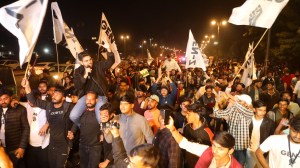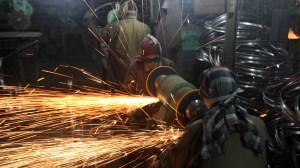Paying for peace
Opinions are now accepted without an armed intervention in favour of one argument against the other,' was how a religious leader from Tyr...

Opinions are now accepted without an armed intervention in favour of one argument against the other,8217; was how a religious leader from Tyre described the situation in Lebanon. 8220;We paid to keep the war going, now we are paying to make the peace,8221; he added, on the tough economic situation prevailing in Tyre, still vulnerable to war on account of Israel8217;s occupation of portions of south Lebanon.
A former detainee, the sheikh was part of a group of residents of Tyre who had been picked up by Israel during its 1982 invasion of Lebanon. He, along with the others in the group, had spent time in Israel8217;s infamous Ansar detention camps. Sitting together in a classroom, the former detainees were discussing the effects of war, as part of the International Committee of the Red Cross initiative to mark the 50th anniversary of the Geneva Conventions.
8220;Unawareness of the value of the human being is the lesson of the war for me8221;, said another detainee. 8220;And this was obvious in the actions of all the warringparties,8221; he added. The Geneva Conventions highlight actions that are not permissible during conflict, both for combatants as well as civilians. The inspiration behind these focus groups was for victims of war to talk about their experiences in relation to international law.
While all in the group described the harassment and killing of civilians as the worst part of the war, 8220;combatants did not do the actions within the framework of the cause8221;, as one former detainee said, a lawyer from Sidon who spent 16 months at Ansar, said the best thing about the war was 8220;coming across people from all communities who still believe in the existence of Lebanon. We would have lost the south of Lebanon but for the resistance from the people8221;.
This anger against repeated Israeli attacks was echoed by another group comprising fishermen from Tyre. One of whom described the situation as the movie that Israel is playing in south Lebanon8221;. The arbritary shelling of fishermen out at sea by Israeli aircraft was the worstpart of the war for most. 8220;Israel bombs our boats, we rebuild them, and Israel bombs them again,8221; summed up a fisherman.
8220;One day 40 of us were out at sea, when the Israelis attacked. We had no shelters to hide in, and the Israelis would not respect the fact that we were in the sea fishing. Many died in that attack,8221; said another fisherman describing his worst experience of the war. 8220;They destroy our nets, which they should not, in all countries of the world unarmed fishermen are not attacked,8221; he added.
This group too was unanimous in its condemnation of attacks on unarmed civilians or maltreatment of the injured. 8220;You should not treat the injured badly. If your enemy is unarmed you cannot attack him, we have international treaties, the Geneva Conventions, on such matters as killing women and children. I can never accept a combatant killing a civilian,8221; said a fisherman from the group while talking about such a killing during the Lebanese civil war in Daamour, near Beirut. But the Lebanese civilwar barely figured in the experiences of the groups in Tyre, because for them the experience of war was at the hands of Israel and its attacks and occupation in the south of Lebanon. They were particularly angry over the indiscriminate use of phosphorous bombs by Israel. Instead of causing casualties by exploding, the phsophorous bomb burns the flesh down to the bone. So when asked to describe the best part of the war, a former Ansar detainee said: 8220;There is no beautiful war, war is always ugly8221;.
- 01
- 02
- 03
- 04
- 05































